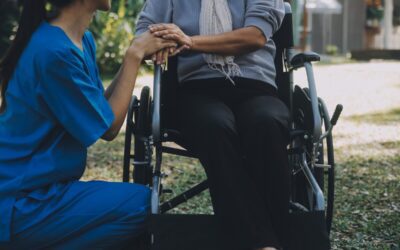
Credit: Nurse Journal
JoAnn Shaw decided she wanted to be a nurse when she was 5. She was in the hospital after getting hit by a car.
“The nurse taking care of me was so nice,” she remembered. Shaw followed through on that dream and became the nurse she looked up to. But after 50 years of committing her entire professional life to caring for others as a full-time nurse, the stress, long hours, and low morale became too much even for Shaw and she retired earlier than she planned.
“I felt I still had maybe another year or two, because I loved caring for people, especially the elderly,” she said. “But I couldn’t continue and keep my mental and physical health in good status.”
And she’s not alone…
The Numbers: During the pandemic, 29% of all nurses in the US said they were unhappy with their job. In Wisconsin, COVID exacerbated the pre-existing nursing shortage. According to the 2022 Wisconsin Hospital Association report, in 2016, 6% of registered nurse positions and 9% of certified nursing assistant positions were open. Last year, those numbers jumped to 11% and 17%, respectively. At that rate, the state is projected to be short almost 20,000 registered nurses by 2035.
“It wasn’t just COVID,” Shaw explained. “Nursing shortages started impacting care back in 2015, slowly at first. This impacts the kind of care patients are getting. You need two people to use lifts on patients. We’re responsible for cleaning, feeding, giving medications to, and caring for dozens of people. And yet they keep cutting staff.”
What Lawmakers Can Do: Although retired from full-time nursing, Shaw continues to serve as president of the Wisconsin Association of Licensed Practical Nurses. In that role, she’s asking lawmakers for help–specifically, more funding so staff doesn’t have to be cut.
“Lawmakers pass the laws,” Shaw said. “We understand that. But they need to listen to doctors and nurses who are working in health care.”
She says adding more funding for BadgerCare, Wisconsin’s health care program for low-income children, pregnant women, and adults, is a start.
What You Can Do: Click here to contact your representative and let them know you want them to address Wisconsin’s nursing crisis.
Support Our Cause
Thank you for taking the time to read our work. Before you go, we hope you'll consider supporting our values-driven journalism, which has always strived to make clear what's really at stake for Wisconsinites and our future.
Since day one, our goal here at UpNorthNews has always been to empower people across the state with fact-based news and information. We believe that when people are armed with knowledge about what's happening in their local, state, and federal governments—including who is working on their behalf and who is actively trying to block efforts aimed at improving the daily lives of Wisconsin families—they will be inspired to become civically engaged.


OPINION: Without the ACA Premium Tax Credit, my family’s health coverage is at risk
Like so many other working families, I don’t know what my family would do without the Affordable Care Act (ACA) premium tax credits. As these...

RFK Jr. ignores 100+ studies to push abortion pill ban—this is the mifepristone explainer you need
By Bonnie Fuller Apprehensive OB-GYNs across the country are alerting Americans that Health & Human Services Secretary Robert F. Kennedy Jr. may...

October is Breast Cancer Awareness Month. Here’s how you can help in Wisconsin
It's Breast Cancer Awareness Month. Here's how you can help fight for a cure throughout Wisconsin. October is globally recognized as Breast Cancer...

A new car vs. health insurance? Average family job-based coverage hits $27K
By Phil Galewitz, KFF Health News With the federal shutdown entering its fourth week, spurred by a stalemate over the cost of health insurance for...





